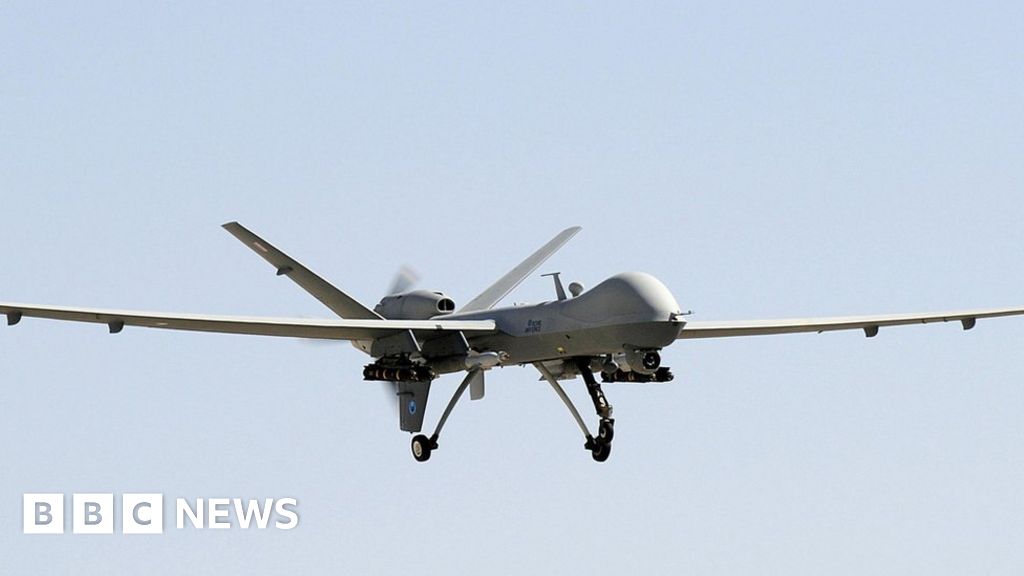Gavin Williamson: Drone 'swarm Squadrons' To Be Deployed By Military

 Image copyright
MOD
Image copyright
MOD
"Swarm squadrons" of drones are to be deployed by British armed forces to overwhelm enemy air defences, the defence secretary has said.
Gavin Williamson said the specially-adapted drones could be in operation by the end of 2019.
He also warned in a speech that the UK needs a bolder and stronger armed forces prepared to use "hard power".
Labour has said the military's role on the international stage had been "completely undermined" by Tory cuts.
South China Sea
Speaking at the Royal United Services Institute, Mr Williamson said Britain must stand up to those who "flout international law".
There was an extra £1.8bn for defence in the last budget and Mr Williamson said Brexit had brought the UK its "greatest opportunity" to strengthen its global presence.
He said the military's cyber capabilities will be reinforced to defend and launch attacks.
The squadrons of "network enabled" drones would cost around £7m, he added.
Analysis
By Jonathan Beale, BBC defence correspondent
Gavin Williamson will struggle to match his global ambitions with the realities of an already overstretched defence budget and a smaller British armed forces.
MPs say there is already a growing black hole in the MoD's £180bn equipment plan.
But instead of making cuts, Mr Williamson is adding more to his shopping list.
He wants two new "multi-role vessels" to support Royal Marines in a range of operations from humanitarian support to war-fighting.
This he believes could be done cheaply by converting civilian cargo ships but there is still no costs or mention of who will crew them - the Royal Navy certainly does not have the manpower.
Mr Williamson talks of introducing swarm squadrons of drones to overcome an enemy's air defences.
The MoD believes the technology could be bought "off the shelf" but, in truth, the concept is still untried and untested.
The MoD still insists these plans have all been costed but its past financial record will give many a reason to doubt.
Detailing plans to modernise the armed forces, he said it must increase its "mass and lethality" - revealing plans for two ships that could be deployed for crisis support as well as military operations.
He said they would be able to respond "at a moment's notice" to support the Royal Marines.
According to the MoD, the UK could purchase and adapt cargo ships or ferries with existing hulls to create the new vessels.
The defence secretary also confirmed the Royal Navy's new aircraft carrier HMS Queen Elizabeth is being deployed to the Pacific region, where China has been involved in a dispute over territorial claims in the South China Sea.
The carrier will take part in the mission along with F-35 jets from the UK and US.
Mr Williamson said Britain and its allies had to be ready "to use hard power to support our interests".
He told those gathered for his speech that "state-on-state competition was reviving".
The defence secretary said Russia is "resurgent" and rebuilding its military arsenal, adding that China is also developing its modern capability and commercial power.
He said: "We have to be ready to show the high price of aggressive behaviour. Ready to strengthen our resilience."
'Paper tiger'
Defending interventionist policy, he said the cost of failing to act in global crises had often been "unacceptably high", and that Western powers cannot "walk on by when others are in need".
"To talk but fail to act risks our nation being seen as little more than a paper tiger," he added.
Mr Williamson said Brexit brought an "unparalleled opportunity" to consider how the UK could maximise its influence around the world.
He said the UK would build new alliances and rekindle old ones, and shared his belief that Britain "should be the nation that people turn to when the world needs leadership".
But shadow defence secretary Nia Griffith said the UK's ability to play such a role had been "completely undermined by eight years of Tory defence cuts".
"The Conservatives have slashed the defence budget by over £9bn in real terms since 2010 and they are cutting armed forces numbers year after year.
"Instead of simply engaging in yet more sabre-rattling, Gavin Williamson should get to grips with the crisis in defence funding that is happening on his watch," she said.
From Chip War To Cloud War: The Next Frontier In Global Tech Competition
The global chip war, characterized by intense competition among nations and corporations for supremacy in semiconductor ... Read more
The High Stakes Of Tech Regulation: Security Risks And Market Dynamics
The influence of tech giants in the global economy continues to grow, raising crucial questions about how to balance sec... Read more
The Tyranny Of Instagram Interiors: Why It's Time To Break Free From Algorithm-Driven Aesthetics
Instagram has become a dominant force in shaping interior design trends, offering a seemingly endless stream of inspirat... Read more
The Data Crunch In AI: Strategies For Sustainability
Exploring solutions to the imminent exhaustion of internet data for AI training.As the artificial intelligence (AI) indu... Read more
Google Abandons Four-Year Effort To Remove Cookies From Chrome Browser
After four years of dedicated effort, Google has decided to abandon its plan to remove third-party cookies from its Chro... Read more
LinkedIn Embraces AI And Gamification To Drive User Engagement And Revenue
In an effort to tackle slowing revenue growth and enhance user engagement, LinkedIn is turning to artificial intelligenc... Read more

